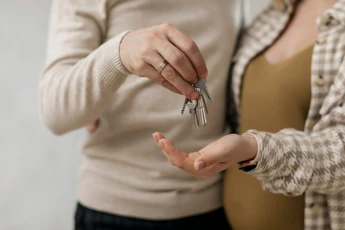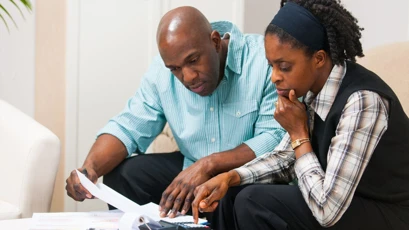Thinking about buying your first home?
When you are buying your first home there is so much to think about, from knowing how much you can borrow, what type of mortgage is right for you and how knowing how much you will need for a deposit. Our first time buyers guide from our expert mortgage advisors, can help you every step of the way. Buying your first home with Expert Mortgages makes a seemingly difficult process seem simple.
We’ll show you each step to buying your first home, including how much deposit you may need, types of mortgages available and what happens when you apply for a mortgage with us.
Lenders have established guidelines for how to calculate how much you can borrow. Although this might vary between lenders, most will consider these details.
Income: All wages, pensions and investments, bonuses, commissions, benefits, or maintenance payments you receive.
Expenses: Essential expenses such as food, travel, childcare and holidays, as well as non-essential expenditures such as vacations and leisure activities.
Debt: Existing credit agreements such as credit cards or overdrafts, or loans.
Deposit: The amount you have saved for a lump sum to be used as a mortgage deposit.
Employment status: Whether you are employed full-time, part-time, self-employed, unemployed, or retired.
Credit history: This includes your credit score, whether you have declared bankruptcy or have had any county court judgements (CCJs), or individual voluntary arrangements.
If you don’t know how much you can borrow, we can help.
Most people need to put down a deposit when they apply for a mortgage. The size of the deposit will vary depending on the lender and the loan-to-value ratio, but it is typically between 5% and 20% of the purchase price. There are several reasons why lenders require a deposit:
It shows that you are serious about buying the property and are willing to put your own money at risk.
It acts as a cushion against any negative changes in the value of the property.
A larger deposit will usually result in a lower interest rate, which can save you thousands of pounds over the term of the loan.
For many people, saving up for a deposit can be a challenge. However, there are several ways to speed up the process, such as using a gifted deposit or taking out a lifetime ISA. With some careful planning, it is possible to buy your dream home sooner than you think.
A mortgage in principle (also known as an agreement in principle or a decision in principle) is an offer of a mortgage from a lender, based on an assessment of your financial situation. It’s not a firm offer, but it gives you an idea of how much you could borrow and is based on an initial affordability assessment.
Once you have a mortgage in principle, you’ll know how much you could afford to borrow from that particular lender. This can make house-hunting more efficient as you’ll only look for properties within your price range.
It’s worth bearing in mind that having a mortgage in principle doesn’t guarantee you’ll get the mortgage when you apply for it. The mortgage lender will carry out further checks when you make a formal application, including a credit check. If your circumstances have changed or your credit score has deteriorated since obtaining the mortgage in principle, this could affect the decision.
Mortgage applications can be a daunting process, with paperwork and forms to fill out. However, we can help to make the process easier. We are experienced professionals who understand the ins and outs of applying for a mortgage. We can guide you through the process and help you to understand the documents you need to provide. In addition, we will offer support and advice throughout the application process. All lenders vary, but normally we will require the following for the application:
/ Proof of ID
/ Proof of income (Payslips or tax return)
/ Bank statements
/ Proof of deposit
It’s worth noting that this is an extremely important stage to get right, as incorrect information, wrong documents or applying for the wrong mortgage could result in your application being rejected, which could incur a significant delay on your journey to owning your own home.
Speaking to an experienced and knowledgeable broker, who can provide advice and who can check your details and documents to ensure they are correct will help prevent that happening.
Mortgage offers are usually valid for six months, although this can vary depending on the lender. Once you’ve received an offer, you’ll need to start the conveyancing process. This is when your solicitor or conveyancer will carry out all the legal work associated with buying a property. They’ll likely arrange for a survey to be carried out on the property.
Sometimes, if information on the application doesn’t match records a lender has access to, or the documents are not acceptable, your application will be declined. This could be for a number of reasons such as missing or late payments, having an account in arrears within six years and making too many applications recently which has resulted on multiple hard searches being recorded against your report. There can also be mistakes made during application process such as incorrect addresses provided.
You can reduce the chance of this happening by speaking to an expert and experienced broker who can guide you through the process.
When you exchange contracts, you are legally committed to buying the property. At exchange, both you and the seller sign the contract and agree on a completion date. You will also pay a deposit (usually 10% of the purchase price). Once exchange has happened, the transaction is legally binding and cannot be cancelled. After exchange, your conveyancer or solicitor will prepare for completion. They will check that all conditions in the contract have been met. A few days before or on completion, they will give the keys to your new home to their agent or solicitor.
On completion day, the balance of the purchase price is paid over, and you can collect the keys to your new home from their estate agent or solicitor. They will also notify the Land Registry of the change in ownership. And that’s it! You are now the legal owner of your new home.
DEPOSITS
A mortgage deposit is the initial amount you pay towards the total price of a home, which reduces the amount you need to borrow for your mortgage. For instance, if a property is priced at £250,000 and you have a £50,000 deposit, you would need to borrow £200,000 from a lender to purchase the house.
The larger your deposit, the less you will need to borrow, and the opposite, a smaller deposit means you will have to borrow more.
To get an estimate of how much you could borrow based on your current deposit, try using our borrowing calculator. If your deposit is insufficient for the property you desire, you may need to save more. Once you determine how much you can borrow, you can calculate your potential monthly repayments.
Many first-time buyers begin with a 5% deposit, which is the minimum required by most lenders, although a 10% deposit is also common.
This percentage is part of what is known as the loan-to-value (LTV) ratio, which compares the amount you are borrowing to the property's value. For example, with a 5% deposit, your LTV would be 95%.
The exact amount you need to save depends on the total price of the property you wish to buy. However, there are advantages to having a larger deposit, including:
· Better interest rates: A higher deposit can qualify you for more favorable rates.
· Increased chances of approval: Lenders may be more likely to approve your mortgage application with a larger deposit.
· Options to borrow more: A bigger deposit can reduce the overall impact of your borrowing.
· Potentially lower monthly repayments: Borrowing less can lead to reduced monthly costs.
While saving for a larger deposit has its benefits, there are also options available if you have limited savings or need to move more quickly.
You can still get a mortgage! With options such as the mortgage guarantee scheme, shared ownership, and Own New, it is possible to purchase a home with a small deposit starting from just 5%. The availability of these options may vary depending on the lender, but most lenders offer solutions for those with smaller deposits. A mortgage adviser can assist you in finding a lender that offers deals tailored to your needs.
Government Schemes
Shared Ownership: This scheme enables you to purchase a portion of a property, while a housing association retains ownership of the remaining share. Although you will pay rent on the portion you do not own, this option typically requires a smaller deposit.
Lifetime ISA: This is a tax-free savings account that allows you to save up to £4,000 toward your first home, with the government contributing an additional 25%.
Right to Buy: If you are a council tenant, you may be eligible to buy your home at a discounted price, which can lower the amount needed for your deposit.
First Homes Scheme: This initiative provides new build homes at a discount of at least 20% for eligible first-time buyers, thereby reducing the deposit amount required.

"Expert Mortgages were recommended by a friend, and I am so pleased! Excellent service, efficient and knowledgeable. The mortgage brokers that Royston needed! Thanks so much for all of your help."
Jenna J.
"A lovely, helpful, and efficient team. Quick to answer all my queries. Highly recommend!"
Emma T.
Important information
Your home may be repossessed if you do not keep up repayments on your mortgage.
There may be a fee for mortgage advice. The actual amount you pay will depend upon your circumstances. The fee is up to 1%, but a typical fee is 0.3% of the amount borrowed.

Real People, Real Mortgage Advice
We’re here to help you through the process of finding a new mortgage, no matter what stage you’re at! Give us call.
We're here to help
Why Use a Mortgage Broker? The Benefits Explained
Navigating the world of mortgages can be a daunting task. With so many options available and a multitude of factors to consider, it’s easy to feel overwhelmed.
Tracker Mortgages vs Fixed Rate
Borrowing has been relatively cheap over the last ten years. With a base rate of below 1% for most of that time, we have become accustomed to low mortgage rates and negligible returns on savings.
The New Mortgage Charter: A Beacon of Hope for Borrowers
The New Mortgage Charter: A Beacon of Hope for Borrowers In the face of rising interest rates, mortgage lenders and the Financial Conduct Authority
No Deposit Mortgage: The 100% Mortgage Solution for First-Time Home Buyers
Dreaming of stepping onto the property ladder, but finding the steep deposit requirements a hurdle? We have good news! As your trusted mortgage broker, we can connect you to Skipton Building Society’s No Deposit Mortgage — a unique home ownership solution designed just for you.
What size mortgage deposit should you aim for?
If you’re looking to buy your first home, you’ll know that, though it’s undoubtedly an exciting time, it’s also stressful. There are many vital boxes to tick and things to consider to ensure that you’re stepping onto the property ladder with the right foot forward.
10 Tips for First-Time Buyers in 2023
The property market in 2023 is complex and ever-changing. First-time buyers have many things to consider as they prepare to make their move. There’s a lot of information to sift through and a lot of guidance out there online – so much so that knowing where to start is its own challenge!






